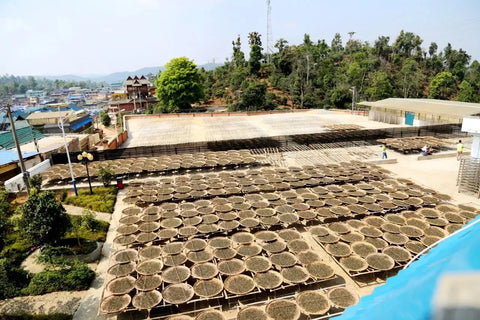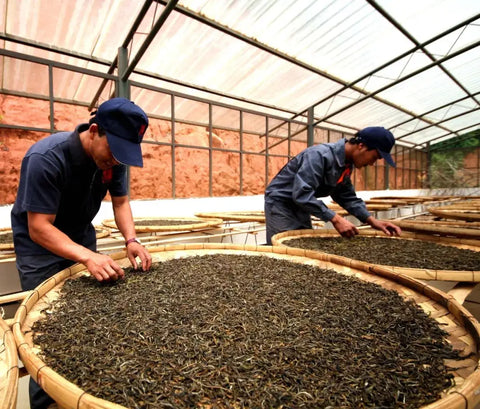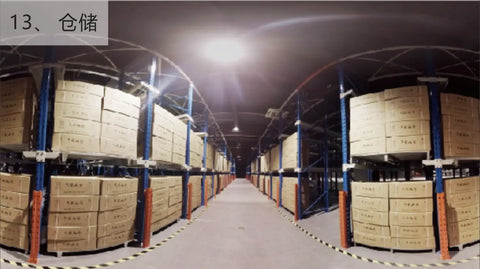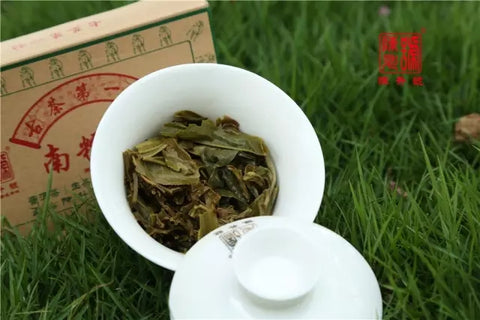Aging Sheng Puerh Tea: Tips for Optimal Results
Aging Sheng Puerh Tea: Tips for Optimal Results
Sheng puerh tea is a beloved variety among tea enthusiasts, thanks to its unique flavor profile and richness. When aged properly, sheng puerh tea can yield a deeper, more nuanced taste that is akin to fine wine. However, the aging process requires patience and attention to detail to achieve the best results. In this section, we will share expert tips on how to age your sheng puerh tea for optimal flavor and complexity.
Key Takeaways
- Aging sheng puerh tea can lead to a mellow, more complex flavor profile.
- Not all sheng puerh teas are suitable for aging.
- Proper storage conditions are critical to achieving good aging results.
- Aging time and monitoring progress are critical factors to consider.
- Enjoying aged sheng puerh tea requires the right brewing techniques and serving suggestions.
What is Sheng Puerh Tea?
If you're new to the world of Puerh tea, you may be wondering - what exactly is sheng Puerh tea? Originating in the Yunnan province of China, sheng Puerh tea is known for its unique fermentation process, which can take decades to complete. This process results in a tea that is often described as earthy, vegetal, and slightly bitter in taste, with a complex flavor profile that varies based on the tea's age and storage conditions.
What sets sheng Puerh tea apart from other types of tea is its ability to age and improve in flavor over time, making it a favorite among tea connoisseurs and collectors alike. The tea's production process involves picking the raw tea leaves, drying them in the sun, rolling and pressing them into cakes, and then allowing them to ferment naturally over time, through exposure to oxygen and moisture. (How is Puerh tea being made?)
Bestsellers
Despite its unique flavor profile and aging potential, sheng Puerh tea is still relatively unknown outside of China and among western tea drinkers. But for those who appreciate the richness of tea and are willing to invest in a long-term aging project, sheng Puerh tea can offer a truly exceptional drinking experience.
Why Age Sheng Puerh Tea?
Sheng Puerh tea, known for its distinct flavor profile, has been a favorite among tea enthusiasts for centuries. But did you know that aging this tea can enhance its flavors and aromas even further? The process of aging allows the tea leaves to mature, develop complex flavors, and create a unique drinking experience.
Aged Sheng Puerh tea is known for having deeper flavors, mellower, and increased complexity. The tea becomes smoother and less bitter, making it an ideal drink to enjoy throughout the day.
"Aged Sheng Puerh tea has a unique flavor profile that cannot be found in any other tea."
Many tea enthusiasts choose to age Sheng Puerh tea because they are looking for a more refined and complex drinking experience. The tea's evolution over time makes every cup a unique experience, as the tea takes on different flavors based on the aging conditions and duration.
If you're looking to expand your tea collection and experience something new, consider aging Sheng Puerh tea.
Selecting the Right Sheng Puerh Tea for Aging
The right tea leaves can lead to optimal aging results that will leave you relishing every sip. To choose the right sheng puerh tea for aging, consider the following factors:
Origin
The terroir of sheng puerh tea plays a critical role in determining its aging potential. Tea leaves grown in the Yunnan province of China, for instance, are famed for producing some of the most spectacular and fully matured sheng puerh. When looking for a selection that will age well, consider a tea originating from this region.

(Lao Ban Zhang puerh tea production site from Chen Sheng Hao)
Processing Techniques
A tea's handling before and after its plucking is crucial in determining how well it will age. For instance, leaves that have been sun-dried and processed under low heat will fare better than those that have been oven-dried. This is because gentle processing methods help preserve the tea's natural enzymes. This, in turn, allows the tea to transform its flavor profile in new and interesting ways over time.

(Chen Sheng Hao workers sun-drying puerh tea)
Lao Ban Zhang
Leaf Grade
The grade of a tea leaf refers to its quality and size, both of which can significantly influence how well it will age. High-quality tea leaves with buds and whole leaves will generally fare much better than smaller or broken leaf teas. These will develop a more complex flavor profile with mellowed tannins, leading to an exceptionally smooth drinking experience.
By looking at the tea's origin, processing techniques and leaf grade, you can gain insight into which sheng puerh teas will age well over time. Try exploring different blends and varieties to discover a selection that ages to perfection and provides a unique and flavorful brew everyone will love.
(Steeped Puerh tea leaves from Chen Sheng Hao)
Proper Storage: A Key to Successful Aging
When it comes to aging sheng puerh tea, proper storage is essential for achieving optimal results. The storage conditions can significantly impact the flavor, aroma, and overall quality of the tea.
The ideal temperature for storing sheng puerh tea is between 68 to 77°F (20 to 25°C). The humidity levels should be around 60 to 70% to keep the tea moist without promoting mold growth. It is best to store the tea away from direct sunlight and strong odors that can influence the taste.
When it comes to storage vessels, choose materials that allow the tea to breathe, such as unglazed ceramics or clay. Avoid using plastic or metal containers that can impart unwanted flavors to the tea. Additionally, storing the tea in airtight containers for long periods can affect the aging process negatively.
By following these proper storage guidelines, you can ensure your sheng puerh tea ages gracefully and reaches its full potential.

Aging Time: Patience is a Virtue
The duration of aging is a crucial factor in shaping the unique flavor and aroma of sheng puerh tea. Typically, younger teas need more time to mature compared to aged teas. Ideally, a sheng puerh tea should be aged for at least five years to reach its flavor and aroma potential.
For beginners, it's recommended to start with a shorter aging time before moving to longer durations. It allows for a better understanding of how aging transforms the tea flavor and aroma. With aging, the tea's astringency and bitterness fade, while its richness and complexity increase.
As their flavor and aroma profile evolves over time, aged sheng puerh teas become more expensive and sought-after among tea enthusiasts. While it's tempting to drink your tea immediately, waiting for the right moment is worth the investment.
However, it's worth noting that aging time alone isn't enough to guarantee optimal results. Proper storage and care are equally important in preserving the tea's quality and achieving the desired flavor and aroma profile.
Monitoring and Tasting the Progress
Monitoring the progress of your aging sheng puerh tea is key to achieving optimal results. As your tea matures, subtle changes in flavor, aroma, and appearance will occur, and it's up to you to observe and determine when your tea has reached its peak.
One effective way to monitor the progress of your tea is to taste it regularly. Start by brewing a small amount of tea and pay attention to any changes in taste or aroma. As your tea ages, you may notice a shift from a stronger, more astringent flavor to a smoother, more mellow taste. Take note of these changes and adjust your storage conditions accordingly.
Tip: Keep a tasting journal to record your observations over time. This will help you keep track of any changes and determine the best time to enjoy your aged sheng puerh tea.
Another way to monitor progress is to visually inspect your tea. Check for any changes in color, aroma, or texture. The tea leaves may darken over time, and the aroma may become more complex and appealing. Check for any signs of mold or off odors, which could indicate improper storage conditions.
Overall, monitoring the progress of your aged sheng puerh tea requires patience and attention to detail. With careful observation and proper storage conditions, you can achieve optimal results and enjoy a truly exceptional drinking experience.
Enjoying the Aged Sheng Puerh Tea
After patiently aging your Sheng Puerh tea, it's finally time to enjoy the rich and complex flavors that develop over time. To fully appreciate the unique taste of aged Sheng Puerh tea, follow these expert brewing techniques:
Brewing Technique
Use freshly boiled water with a temperature 212°F (100°C) to brew the tea. Rinse the tea leaves with hot water quickly before steeping them for a few seconds to release the flavors. Gradually increase steeping time with subsequent brews while maintaining consistent water temperature. Final steeping time depends on personal taste preferences, but it can vary between 10 seconds to few minutes.
Teaware Recommendations
For brewing aged Sheng Puerh tea, use a Gaiwan or Yixing clay teapot. The small size and porous material of these teawares allow for better heat retention and more effective extraction of flavor from the tea leaves.
Serving Suggestions
Enjoy your aged Sheng Puerh tea straight, without any milk or sugar to savor the complex flavors fully. Pair the tea with light snacks such as fruits and nuts to complement the subtle sweetness and earthy tones of the tea.
In conclusion, sipping on a cup of aged Sheng Puerh tea is a true indulgence for tea connoisseurs seeking a unique and rewarding experience. Follow these tips to prepare and serve your tea, and enjoy the rich flavors and complex aromas that come with aging Sheng Puerh tea.
Storing Aging Sheng Puerh Tea: Dos and Don'ts
Proper storage is essential to maintaining the quality of your aging sheng puerh tea. Follow these dos and don'ts to ensure optimal results:
| Do: | Don't: |
|---|---|
| Store your tea in a clean, dry space away from strong odors and direct sunlight. | Expose your tea to extreme temperatures or humidity, which can negatively impact its aging process. |
| Avoid storing your tea in plastic containers, which can cause unwanted flavors and aromas to seep into your tea. | Store your tea in glass containers, which can expose your tea to harmful UV rays. |
| Use containers to prevent moisture from entering and affecting your tea's taste and aroma. | Store your tea with other strong-smelling foods, which can taint the taste and aroma of your tea. |
By following these simple guidelines, you can ensure that your aging sheng puerh tea continues to develop its unique flavor, aroma, and complexity over time.
Conclusion
Investing time and effort in aging your sheng puerh tea can lead to a truly exceptional drinking experience. By following the tips provided in this article, you can unlock the full potential of your tea and savor the complex flavors and aromas that come with proper aging.
Remember to select a high-quality tea that is suitable for aging, and store it properly in a cool, dark place with the right humidity level. Patience is key when it comes to aging tea, so resist the urge to try it too soon and monitor its progress regularly. When it's ready, enjoy your aged sheng puerh tea with the right brewing technique and teaware.
By avoiding common storage mistakes, you can ensure that your aged sheng puerh tea maintains its quality over time. Keep in mind that each tea has its own aging characteristics, so experiment with different aging times to find the perfect match for your taste.
With the right approach, aging sheng puerh tea can be a rewarding experience that results in a truly delicious cup of tea. So go ahead, give it a try, and discover the many benefits of aging this beloved tea variety.
FAQ
What is aging sheng puerh tea?
Aging sheng puerh tea refers to the process of allowing the tea to mature over time, typically for several years or more. During this aging process, the tea undergoes natural fermentation and oxidation, resulting in the development of deeper flavors, mellower, and increased complexity.
Why should I age sheng puerh tea?
Aging sheng puerh tea can significantly enhance the overall taste and drinking experience. The aging process allows the tea to mellow and transform, unlocking unique flavors and aromas that are not present in fresh tea. It also creates a smoother and more well-rounded brew, making it a favorite among tea connoisseurs.
How do I select the right sheng puerh tea for aging?
When choosing a sheng puerh tea for aging, it is essential to consider certain factors. Look for teas that are made from high-quality leaves, preferably from old trees or reputable tea gardens. Consider the processing techniques used and opt for teas with a higher leaf grade. These characteristics will contribute to the tea's aging potential and ultimate flavor transformation.
What are the key factors for proper storage of aging sheng puerh tea?
Proper storage conditions are crucial for the successful aging of sheng puerh tea. It is important to store the tea in a cool, dry, and well-ventilated area. Maintain a stable temperature and humidity level, avoiding exposure to direct sunlight, strong odors, and excessive moisture. Storing the tea in porous containers, such as clay, can also help facilitate the aging process.
How long should I age sheng puerh tea?
The aging time for sheng puerh tea can vary depending on personal preference and the desired flavor profile. Some people enjoy the flavors that develop after just a few years of aging, while others prefer longer periods of aging for a more profound transformation. It is recommended to start tasting the tea regularly after a couple of years to monitor its progress and determine when it has reached its peak.
How can I monitor the progress of aging sheng puerh tea?
Monitoring the progress of aging sheng puerh tea requires regular tastings and observations. Taste the tea at different stages to appreciate the evolving flavors and aromas. Look for signs of maturity, such as the smoothness of the brew, the richness of the color, and the complexity of the taste. Document your observations to track the tea's development over time.
How do I enjoy aged sheng puerh tea?
To fully enjoy the unique flavors and complexities of aged sheng puerh tea, it is recommended to use proper brewing techniques and teaware. Use freshly boiled water and steep the tea for a longer duration to extract the rich flavors. Consider using a gaiwan or a clay teapot to enhance the tea's nuances. Experiment with different brewing methods and find the one that best suits your preferences.
What are the dos and don'ts of storing aging sheng puerh tea?
When storing aging sheng puerh tea, it is essential to avoid exposing it to extreme temperatures, excessive moisture, and strong odors. Do store the tea in odor-free containers to maintain its quality. Avoid storing the tea near spices, coffee, or other strongly scented items. Additionally, refrain from overhandling the tea leaves, as excessive touching can affect their aging process.
← Older post Newer post →












